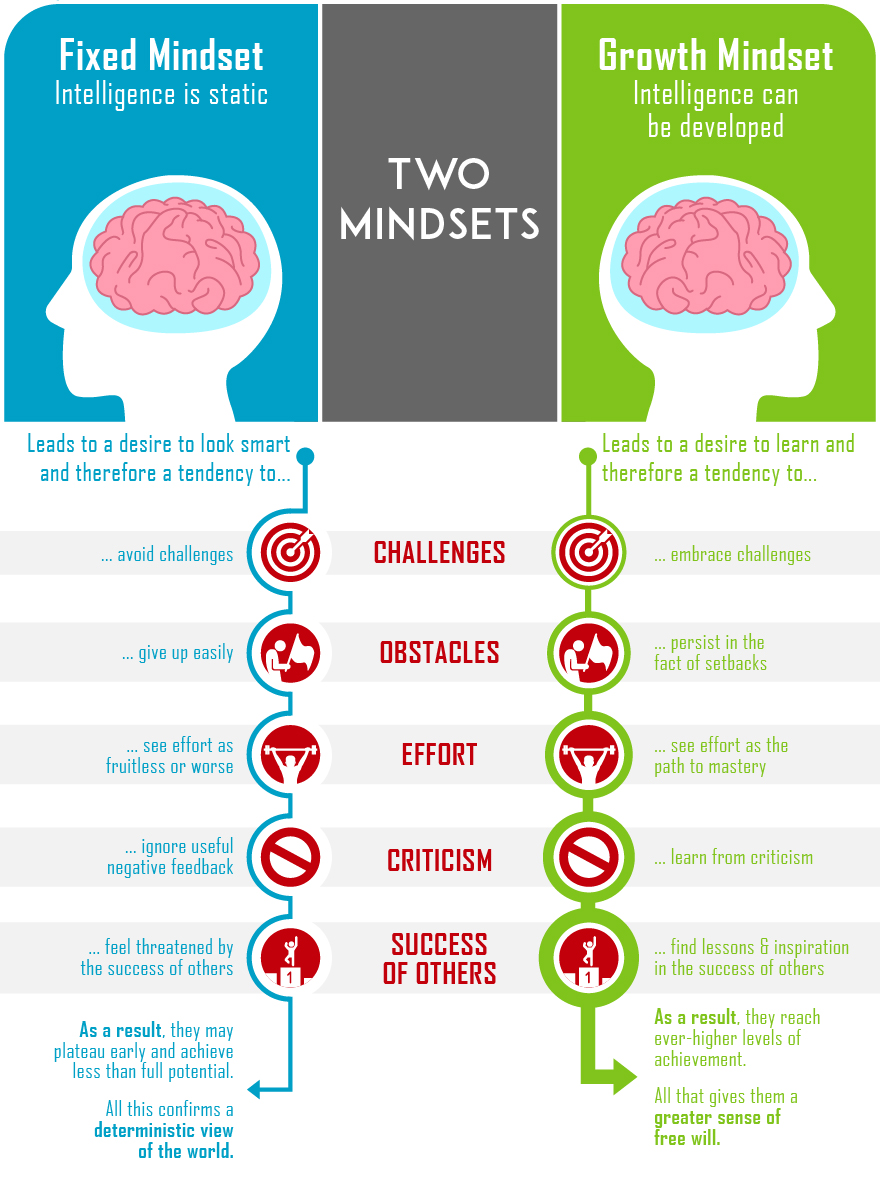The discussion about the growth mindset remains a hot topic in efforts to explain what the advantages are and how a growth way of thinking helps you maneuver through the difficulties in life. Yet, although it sometimes is hard to push forward and not give up, having a growth mindset in your everyday life proves to be fruitful.
Growth Mindset at a glance
We have already talked about the differences of having either a growth mindset and a fixed mindset and how you can change your way of thinking.
In summary, a fixed mindset believes the basic qualities like intelligence or talents are fixed traits, responsible for success. But a growth mindset acknowledges that intelligence and talent can go up or down because these are mutable based on experience and attitude.
American Psychologist Carol Dweck has stated that
“In one world, effort is a bad thing. It, like failure, means you’re not smart or talented. If you were, you wouldn’t need effort. In the other world, effort is what makes you smart or talented.”

Tips for a growth mindset
To better explain the pros of having a growth mindset, it is important understand the five pillars of life – health, sport, money, business and relationships – and the mindset you can build around them.
#1 The fixed mindset VS the growth mindset
Understand what a fixed mindset is and how it can negatively impact your life so that you can adapt to new way of living. Having a mixed mindset means that you do not overcome an obstacle, but you look for an easy way to avoid it. In addition, those having a fixed mindset may think that one person is successful just out of luck and not by any effort.
#2 Try different learning tactics
There’s no one-size-fits-all model for learning. What works for one person may not work for you. This means that you can experience with new things and new tactics to understand what fits with your personality and character.
#3 Progress mindset
The tendency to believe you can grow, boosts your confidence and makes you believe more in yourself and your capabilities. Dedication is the key, while accepting your failures are important features of progress.
#4 Mindset in health
It is crucial to change your life and way of thinking gradually and know that the change will come if you try and be patient. Having a schedule is the key to maintaining a healthy lifestyle.
#5 Mindset in sports
Ms Dweck says “not yet” has become one of her favourite phrases. Whenever you struggle, just keep in mind that you haven’t mastered it yet. The ‘not yet’ mindset means that one day you’ll be better.
#6 Mindset in business
Understand the importance of placing effort before talent. You have to keep in mind that growth is what you have to worry about and to value the progress you make. Hard work should always be rewarded before inherent skill.
#7 Mindset in money
Finances in particular can trigger a fixed mindset. However, shifting to a growth mindset in our money lives is one of the most effective strategies. Understanding where you lack and what you can improve is a better option than running away from your economic problems.
#8 Mindset in relationships
Relationships play a major role in our life; They are what causes the most pain and most joy.
In her book “Mindset” Dweck says that
“I’ve seen so many people with this one consuming goal of proving themselves in [a learning setting], in their careers, and in their relationships. Every situation calls for a confirmation of their intelligence, personality, or character. Every situation is evaluated: Will I succeed or fail? Will I look smart or dumb? Will I be accepted or rejected? Will I feel like a winner or a loser?”
Having a growth mindset in relationships helps you understand the effort needed to always improve and the importance of “giving”. On the other hand, a fixed mindset focuses on the flaws of the character and may support the notion of not having to word on a relationship if it’s meant to be.
Owning our part in a relationship is important.
#9 The two dangerous words
“I can’t”. Remember that the two most powerful words are “I am,” being able to place you identity and knowing what you stand for.
The standpoint of “I can’t” will affect the way you view things. You will have a negative point of view and will not want to do things. It will overall affect you.
#10 Take ownership over your attitude.
Once you develop a growth mindset, own it. Support you own growth mentality and be proud to let it guide you in your life.
Plus tip: The power of yet
Dweck discusses the power of the word “yet” and how simply believing that you can improve impacts your ability to succeed.




























































